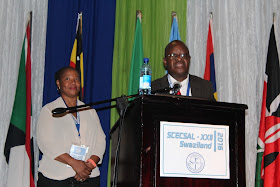 |
Representatives of SCECSAL member Associations
who took the bold decision to establish a permanent
secretariat for SCECSAL [Photo: Justin Chisenga] |
The General Assembly, the highest authority of the Standing Conference of Eastern, Central and Southern African Library and Information Associations (SCECSAL),
resolved on 29 April 2016 at its XXIInd meeting in Ezulwini, Swaziland, to establish a Permanent Secretariat for SCECSAL.
The 11-member General Assembly also resolved to amend the
SCECSAL constitution to pave the way for the establishment of the Permanent Secretariat and to put in place mechanisms to ensure proper coordination of the Forum’s activities, and monitoring implementation of its resolutions and decisions.
The members also resolved that the
Swaziland Library and Information Association (SWALA) would henceforth temporarily host the SCECSAL Secretariat until such time as a permanent secretariat is established and becomes operational.
SCECSAL,
established in 1974, has had its secretariat held and managed by member Associations on a rotational basis for a term of two years each.
Efforts to establish a permanent secretariat, as part of the need to reform SCECSAL, have been going on since the SCECSAL conference in 2000, in Windhoek, when Charles Lungu, the then Deputy University Librarian at the Copperbelt University, Kitwe, Zambia, proposed changes to “SCECSAL without altering its character” and recommend the formation of a federation of library associations in the region, which would have committees to carry out functions including those that SCECSAL has been accused of failing.
 |
Participants at XXIInd SCECSAL in
Ezulwini, Swaziland [Photo: Justin Chisenga] |
In 2002, at the SCECSAL conference in Johannesburg, a proposal was made again to establish a permanent secretariat and was later discussed at the 2004 conference in Kampala, and in both cases the General Assembly failed to make a decision.
The 2002 and 2004 efforts were followed, in 2007, by a proposal from the Tanzania Library Association, under the guidance of Dr. Alli Mcharazo, which outlined three options for SCECSAL reforms:
- transforming SCECSAL into a regional body with registered chapters in the member countries, with Governing Council comprising of the President, Vice President, Treasurer, and Board Members [directly elected];
- forming a Regional Federation of Library, Information Associations and Institutions (RFLIAI) to resemble IFLA; and
- establishing a Congress of Library and Information Associations and Institutions in Eastern, Central and Southern Africa headed by an Executive Board made up of board members from each member library Association and Institutions.
The proposal was discussed at the SCECSAL General Assembly meetings in Lusaka (2008) and Gaborone (2010) and there was no consensus on which of the three options to be adopted, and the issue disappeared from the SCECSAL agenda until April 2016 when it re-surfaced.
Considering the failure, on several occasions, in the past by the SCECSAL General Assembly to radically reform SCECSAL, the 29 April 2016 resolution to work towards establishing a Permanent Secretariat is a very bold move.
However, unless things move at a relatively faster pace than has been the case in the past, and the Presidents and Chairpersons of the SCECSAL member Associations act in good faith during the process of setting up and choosing the member Association to host the Permanent Secretariat,
SWALA might as well start preparing to host temporarily the permanent Secretariat for SCECSAL for a long time.
---
Visit the SCECSAL website to
download a copy of the XXII SCECSAL Resolutions.












































